Events and Activities
Onsite DIJ Panel Discussion on Migrants’ Histories
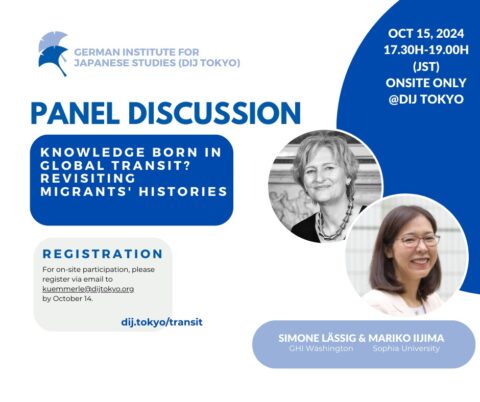 This panel discussion explores the relationship between migration and knowledge production, emphasizing the role of migrants as transmitters and producers of new knowledge. Using historical case studies, Simone Lässig challenges the binary of assimilation and conflict by showing how immigrants in the 19th and 20th centuries acted as cultural translators, shaping both their own communities and host societies. Intersecting the history of migration with the history of knowledge, the talk offers insights into the dynamics of migration and reveals the ways in which migrants contribute to global knowledge flows. Mariko Iijima will add a Japanese perspective on the approach based on her own research on the Japanese diaspora. Details and registration here
This panel discussion explores the relationship between migration and knowledge production, emphasizing the role of migrants as transmitters and producers of new knowledge. Using historical case studies, Simone Lässig challenges the binary of assimilation and conflict by showing how immigrants in the 19th and 20th centuries acted as cultural translators, shaping both their own communities and host societies. Intersecting the history of migration with the history of knowledge, the talk offers insights into the dynamics of migration and reveals the ways in which migrants contribute to global knowledge flows. Mariko Iijima will add a Japanese perspective on the approach based on her own research on the Japanese diaspora. Details and registration here
International Workshop ‘Imagined Futures in Japan & Beyond’ at DIJ
 The future begins with imagination. One example are the Sci-Fi prototyping initiatives of Japanese tech giants like Sony and NTT, which intentionally utilize storytelling to foster public acceptance of emerging technologies. Focusing on the connection between narratives, culture, technological innovation, and marketing, this interdisciplinary workshop delves into both fictional and non-fictional portrayals of Japan’s technological future. Twenty international scholars and practitioners from Japan’s tech industry will join us to analyze visions of emerging technologies, of their environmental and societal impact, and of Japan as a “futuristic” nation through the lens of “narrative” and “sociotechnical imaginary” theoretical frameworks. The workshop is organised by DIJ researcher Nicole M. Mueller and supported by the German Center for Research and Innovation (DWIH) Tokyo. It will open with a public DIJ Forum with keynotes by Fritz Breithaupt (Indiana University Bloomington) and Hirotaka Osawa (Keio University). Details and registration here
The future begins with imagination. One example are the Sci-Fi prototyping initiatives of Japanese tech giants like Sony and NTT, which intentionally utilize storytelling to foster public acceptance of emerging technologies. Focusing on the connection between narratives, culture, technological innovation, and marketing, this interdisciplinary workshop delves into both fictional and non-fictional portrayals of Japan’s technological future. Twenty international scholars and practitioners from Japan’s tech industry will join us to analyze visions of emerging technologies, of their environmental and societal impact, and of Japan as a “futuristic” nation through the lens of “narrative” and “sociotechnical imaginary” theoretical frameworks. The workshop is organised by DIJ researcher Nicole M. Mueller and supported by the German Center for Research and Innovation (DWIH) Tokyo. It will open with a public DIJ Forum with keynotes by Fritz Breithaupt (Indiana University Bloomington) and Hirotaka Osawa (Keio University). Details and registration here
Join the DIJ team as librarian (application deadline: 1 December)
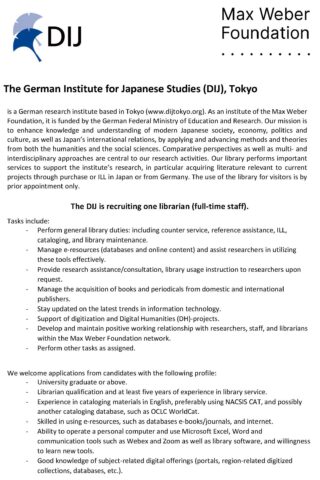 We are recruiting one librarian for our DIJ library. Tasks include general library duties, managing e-resources, research assistance/consultation and library usage instruction to researchers, and the acquisition of books and periodicals from domestic and international publishers. We welcome applications from qualified candidates with a university degree, librarian qualification, at least five years of experience in library service, experience in cataloging materials in English and in using e-resources, such as databases e-books/journals, and internet. The successful candidate should be able and willing to run the library as sole librarian. Applicants must be fluent in English and in Japanese, and preferably German. They must either have Japanese nationality or otherwise be in possession of a Japanese working visa. The employment would be first on a two-year basis, preferably starting on March 1, 2025, with the option of a permanent position thereafter, if certain conditions are met. Individuals interested in this position are invited to submit a cover letter stating their motivation for this position and CV in English via our online application system no later than December 1, 2024. Please see the full job advertisement in English and in Japanese
We are recruiting one librarian for our DIJ library. Tasks include general library duties, managing e-resources, research assistance/consultation and library usage instruction to researchers, and the acquisition of books and periodicals from domestic and international publishers. We welcome applications from qualified candidates with a university degree, librarian qualification, at least five years of experience in library service, experience in cataloging materials in English and in using e-resources, such as databases e-books/journals, and internet. The successful candidate should be able and willing to run the library as sole librarian. Applicants must be fluent in English and in Japanese, and preferably German. They must either have Japanese nationality or otherwise be in possession of a Japanese working visa. The employment would be first on a two-year basis, preferably starting on March 1, 2025, with the option of a permanent position thereafter, if certain conditions are met. Individuals interested in this position are invited to submit a cover letter stating their motivation for this position and CV in English via our online application system no later than December 1, 2024. Please see the full job advertisement in English and in Japanese
Celia Spoden to give keynote at Japan-Germany science and technology cooperation anniversary event
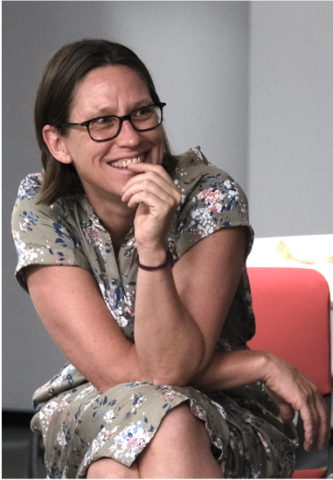
Upon invitation by the Federal Minister of Education and Research, DIJ principal researcher Celia Spoden will give a keynote speech at the anniversary event to celebrate 50 years of science and technology cooperation between Japan and Germany. Drawing on her research project on Cyber-physical spaces and avatar technologies: new opportunities for an inclusive society? she will explain ‘Why Technology Development Needs the Social Sciences: Opportunities and Risks of Avatar Robots’. The event takes place in Kyoto on October 6 and will be attended by leading representatives from both countries’ ministries, research and funding organisations. The two other keynotes will be given by the president of the German Research Foundation (DFG), Katja Becker, and by Ishiguro Hiroshi (Intelligent Robotics Laboratory, Osaka University), a leading Japanese roboticist and engineer.
Open access book by Nicole M. Mueller studies Japanese Thomas Mann translations
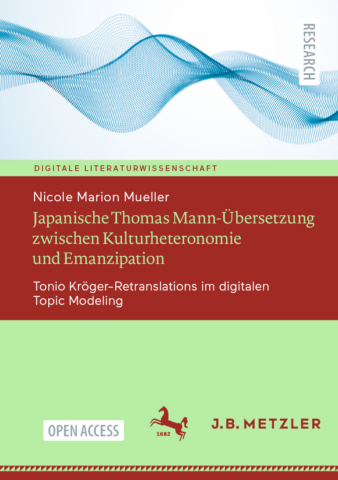
In her new book Japanische Thomas Mann-Übersetzung zwischen Kulturheteronomie und Emanzipation: Tonio Kröger-Retranslations im digitalen Topic Modeling (Japanese Thomas Mann translation between Cultural Heteronomy and Emancipation: Digital Topic Modeling of Tonio Kröger Retranslations), DIJ researcher Nicole Marion Mueller uses innovative digital methods to study Japanese translation pluralism in the 20th century. Focusing on Japanese translations of Mann’s novel Tonio Kröger, she retraces the intensive reception of Mann’s literary works in Japan while paying special attention to the interrelations between translation and a variety of historical contexts and actors – most prominently the elitist kyoyoshugi movement rooted in Japan’s prewar education system. Nicole combines this extensive research work with a topic modeling-based mixed methods approach, which enables her to reveal the previously hidden interactions between the re-translated texts as well as patterns of influence and distinction spanning decades of translation history. The book is published by J.B. Metzler in the Digital Literary Studies series and available open access.
Barbara Holthus explains Germany’s fertility rate development in Japanese journal article
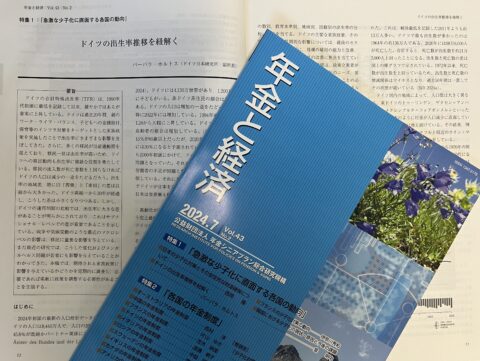 Unlike Japan, Germany’s total fertility rate has shown a slow but steady increase since its lowest point in the early 1990s. What are the factors behind this development? In the article 「ドイツの出生率推移を紐解く」(“Unraveling Germany’s fertility rate development”, in Japanese), DIJ sociologist Barbara Holthus explains how Germany has implemented a mix of family policies targeting time, money, and infrastructure measures for parents. Over the last 20 years, they have had varying influences on the fertility rate. As data shows, migration trends into Germany also play a complex role for its fertility rate, as many migrants are of child-bearing age and first-generation migrants have higher birthrates. In addition, there are significant differences in fertility rates at the sub-national level. Recent macro level influences like war and climate change are also important influences on Germany’s youth, coupled with rising rates in mental health problems. The article is published in a special section on countries facing a rapidly declining birthrate in the summer issue of the Japanese journal Pension and the Economy (『年金と経済』).
Unlike Japan, Germany’s total fertility rate has shown a slow but steady increase since its lowest point in the early 1990s. What are the factors behind this development? In the article 「ドイツの出生率推移を紐解く」(“Unraveling Germany’s fertility rate development”, in Japanese), DIJ sociologist Barbara Holthus explains how Germany has implemented a mix of family policies targeting time, money, and infrastructure measures for parents. Over the last 20 years, they have had varying influences on the fertility rate. As data shows, migration trends into Germany also play a complex role for its fertility rate, as many migrants are of child-bearing age and first-generation migrants have higher birthrates. In addition, there are significant differences in fertility rates at the sub-national level. Recent macro level influences like war and climate change are also important influences on Germany’s youth, coupled with rising rates in mental health problems. The article is published in a special section on countries facing a rapidly declining birthrate in the summer issue of the Japanese journal Pension and the Economy (『年金と経済』).
Book chapter by Nicole M. Mueller on the historical and institutional contexts that shaped Japanese retranslation
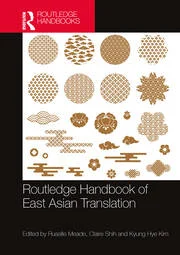 Since ancient times, translation into Japanese has facilitated innovation across a variety of disciplines. Translators functioned as mediators of a foreign culture that was commonly perceived as superior. This tradition became all the more essential after Japan’s forced reopening in the late 19th century after 200 years of self-imposed cultural isolation. In this context, retranslations of Thomas Mann’s classic novel Tonio Kröger form a crucial interface between Japan’s academic, educational, and literary history shaped by the elitist kyōyōshugi movement and its idealisation of 19th century European culture. Based on the digitally augmented analysis of 15 such retranslations, DIJ researcher Nicole M. Mueller retraces how 20th and 21st century Japanese retranslation can be understood as the result of an ongoing negotiation between heteronomy and autonomy toward the West that shaped Japan’s cultural self-image. “Japanese Retranslations in the Twentieth and Twenty-first Centuries: Between Heteronomy and Autonomy toward the West” is published in the Routledge Handbook of East Asian Translation.
Since ancient times, translation into Japanese has facilitated innovation across a variety of disciplines. Translators functioned as mediators of a foreign culture that was commonly perceived as superior. This tradition became all the more essential after Japan’s forced reopening in the late 19th century after 200 years of self-imposed cultural isolation. In this context, retranslations of Thomas Mann’s classic novel Tonio Kröger form a crucial interface between Japan’s academic, educational, and literary history shaped by the elitist kyōyōshugi movement and its idealisation of 19th century European culture. Based on the digitally augmented analysis of 15 such retranslations, DIJ researcher Nicole M. Mueller retraces how 20th and 21st century Japanese retranslation can be understood as the result of an ongoing negotiation between heteronomy and autonomy toward the West that shaped Japan’s cultural self-image. “Japanese Retranslations in the Twentieth and Twenty-first Centuries: Between Heteronomy and Autonomy toward the West” is published in the Routledge Handbook of East Asian Translation.
Working Paper by Harald Kümmerle on Japanʼs COVID-19 response, surveillance capitalism and cyber civilization
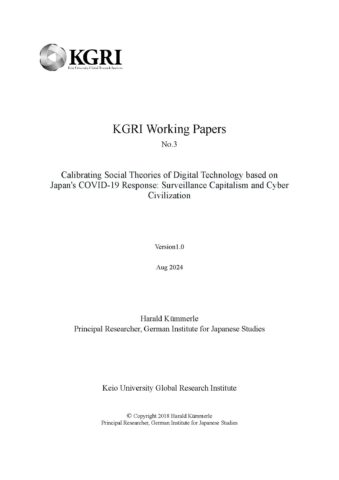
A new working paper by DIJ researcher Harald Kümmerle examines Japan’s response to the COVID-19 pandemic in comparison to other East Asian countries. Drawing on Shoshana Zuboffʼs perspective of surveillance capitalism and Jiro Kokuryoʼs theory of cyber civilization, it argues that Japanʼs aerosol and droplet simulations on the supercomputer Fugaku helped devise efficient countermeasures that did not aim for the complete elimination of the virus. The paper also demonstrates the importance of understanding how the measures in Japan related to the idea of trust and successfully relied on self-restraint (jishuku). Calibrating Social Theories of Digital Technology based on Japan’s COVID-19 Response: Surveillance Capitalism and Cyber Civilization is published open access as Working Paper No. 3 by Keio University’s Global Research Institute.





 Open Access
Open Access
